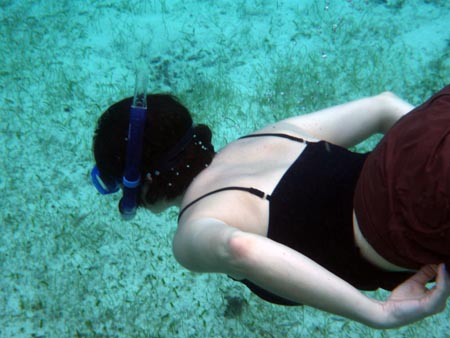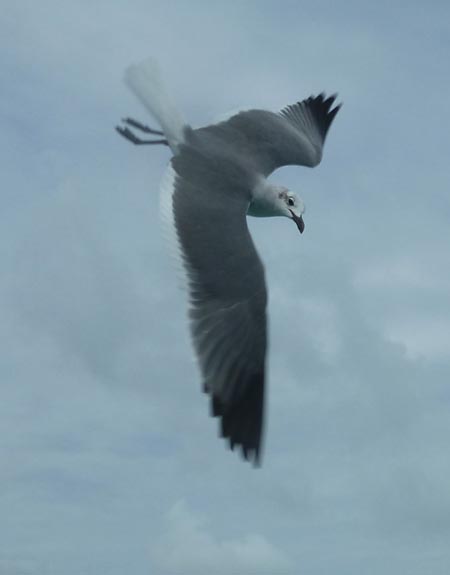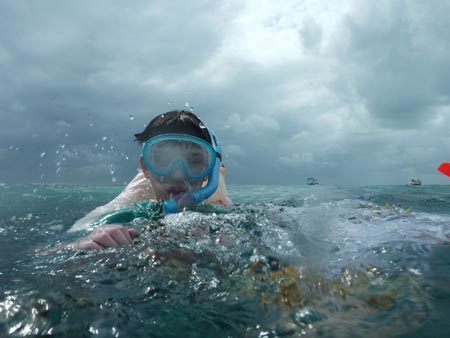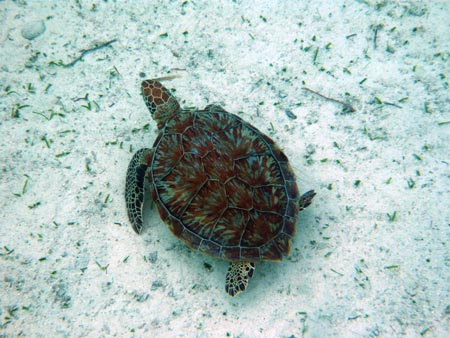|
|
|
Belizian barrier reef
Wednesday, December 31 2014
location: Orchid Garden Resort Ecolodge, Hattieville, Belize
Today only one activity was planned, and we had to get up early for it so we could eat our breakfast and not miss a boat. The plan was to snorkel along a barrier reef to the northeast of Belize City, out among the many islands in the Belizian Caribbean, where the average slope of the land (which becomes waterlogged with brine just east of Orchid Garden) causes it to gradually recede beneath the waves.
Alfredo, who seems to be the top peon working for Christine at Orchid Garden, drove us into downtown Belize City, where eventually we boarded a crowded water taxi that took on a rough half-hour ride to the east coast of Caye Caulker, a several-mile-long island a couple miles west of the barrier reef. When I say rough, I mean that the boat kept bouncing off the surface of a continuous washboard of waves, pounding me in the ass as if I were a prisoner's bitch. Gretchen and I had made the mistake of sitting in the front of the boat, where people seemed to be bouncing around a lot more than they were in the back. We should have followed the two Mennonite dudes who'd made a beeline for the rear of the boat. Those guys may not know much about fast Fourier transforms, but they have a good practical sense of how the material world is put together and functions, and though they live plain lives, they're not ones to suffer unnecessary punishment.
Caye Caulker is a cute little island with streets lines with small colorful houses. People walk around without shoes and most of the motorized vehicles are golf carts. Gretchen gestured longingly towards a small brightly-painted hotel right there on the beach. It was her idea of heaven, at least at this time of year. But we hadn't come here to participate in Cauker's unique Jimmy Buffetesque society, enticing though it was. We met the tour guide for today's snorkeling outing, and he led us to a small dive shop where he outfitted each of us with fins (we'd brought our own snorkels). From there, we walked over to the west side of the island, past Caye Caulker's main power station, which consisted of several shipping-container-sized diesel engines roaring semi-reliably as they belched black smoke into the air. After a piss break at a gas station, we loaded up into a small motorboat and set out for the barrier reef, some half hour away.
We arrived in a section of seemingly open water that was already populated by other snorkelers. Once we were tied to another boat in the makeshift flotilla, a ranger boat came up and our guide had to give the reef preservation authority that governs and maintains it their cut of the money our contingent had paid.
During a quick lunch of rice & beans (the dry kind containing almost no beans), the winds kept blowing the rice from our forks before it could make it into our mouths. Unfortunately no hot sauce on board.
What kept the water around us from being truly open water was the sound of waves crashing against the nearby reef, where the water level must have been only a foot or two deep. And even where our boat was secured, the water was shallow enough for me to stand on the bottom while adjusting my snorkel. It was only once we began swimming around looking at things that it felt like we were in open water. Our guide wanted us to stay close to him so he could give us a tour of the reef, and he led us out into deep water where there was no chance of me grabbing onto a rock so I could rest and have the freedom to make adjustments. Out in the open water, any attempt to fix or adjust my goggles or snorkel always ends in disaster, with water getting into places it shouldn't (such as the compartment covering my nose) and then tormenting me for the rest of my swim. So I feel vulnerable in places where I cannot rest with my head and hands in the air. This was less of a problem for the others, some of whom snorkeled with the assistance of life vests. Their main problem was the briskness of our tour guide's pace. Eventually we got to a shallow spot where the matter could be discussed. Our guide very reasonably pointed out that unless we moved more quickly, we wouldn't go anywhere because of the force of ocean currents.
[REDACTED]
After further heated discussion,
the guide backed down and suggested we just make our way back to the boat and maybe look at some sea turtles along the way. That seemed fine to me. The turtles were huge and the details of their markings coupled with the deliberativeness of their movements made them look like Pixar animations. They moved slowly along the bottom eating the grasslike seaweed, and our presence didn't concern them at all. At around this time, I was having so much trouble with my equipment that I swam over to a nearby boat (not ours), grabbed onto the side to stabilize myself, and did my best to make things comfortable.
Back at the boat, our guide identified a Nurse Shark that had taken up residence in the shadow our boat was casting on the seafloor. (The kids' mother had heard the word "shark" on the briefing on the way out and expressed momentary concern, apparently willing to believe that a dive guide might think it was a good idea to put a bunch of gringos in the water with a revenous man-eating shark, but Nurse Sharks have small sucking mouths and behave like giant catfishes; they even have whiskers.)
Our guide motored us some distance south along the reef and tied up with the boats in another cluster. We'd come to a place where it was legal to chum to the waters so as to bring sharks close to the boat. Our guide put a perforated PVC cylinder into the water presumably filled with something that smelled delicious and proceeded to toss chunks of small fish into the water, where they were immediately snapped up by several large Nurse Sharks (and a number of smaller, nimbler bony fish). Whenever the sharks grabbed something, their sucking mouths made a distinct pneumatic popping sound, which is how the species got its name. We were told it was safe to go into these shark-i nfested waters, though we were urged to stay at least four feet from the sharks.
At the last spot, everyone had gone swimming except for my eight year old niece and her mother; swimming in the open ocean had been understandably terrifying for the little girl even with the assistance of a life vest, but she'd been disappointed to miss the turtles and the shark. This time she tried swimming again, but again freaked out and decided to get back in the boat. As for me, I swam around the boat once or twice, watched the remora-bedecked sharks feeding nearby, and then got out of the water. It was a cloudy, windy day, and I'd been unable to raise my core body temperature after the last time I'd been in the water, so I was cold. Happily, the sun broke through the clouds for five or ten glorious minutes after I'd toweled myself off, so I spread myself out like a reptile to absorb the rays. Meanwhile our guide was having a good time swimming around with Gretchen (the strongest swimmer besides himself). He enjoyed lying on his back on the seafloor and blowing air bubbles towards the surface that rose in toroids, like smoke rings.
At our third and final stop some distance south along the reef, there were no other boats nearby, and our guide had to drop an anchor. This time we were free to swim around on our own to explore the "coral gardens." They were spectacular, but I was still cold and having trouble with my gear, so again I didn't stay in the water very long. I did, however, experiment for the first time with swimming downwards into the depths to where the deep water momentarily hugged me in a crushing embrace. In the past I'd been too concerned about flooding my equipment, but with the boat nearby to easily get back to, I was feeling adventurous.
After we were all done swimming, our guided handed out pieces of fruit that he'd been cutting up during our final swim. Often fruit is presented as part of a meal, and I'm less interested in it then. But in this case, presented as a snack after something energetic, it was exactly what my body was craving. The watermelon wasn't very good, but the fresh pineapples and bananas were like nothing one can get at a grocery store in the United States.
Heading back along the west coast of Caye Caulker, our guide pointed out where Hurricane Hattie cut a gap through the island back in 1961 (which Wikipedia says is a myth). He also took us to a bay where some species of large fish enthusiastically responded to chumming from someone in another boat. "Don't put your fingers in the water," our guide advised. Just before getting back to the dock, we saw the dorsal fins of a number of Bottlenose Dolphins, but they didn't stick around.
We slowly made our way back to the diving shop after first stopping at that gas station for bathroom breaks. While various business was attended to in the shop, I sat on a bench in the back and watched a group of children playing on a board balanced across an old oxygen tank. They would stand on either end and rock it up and down like a see-saw until one of the kids would jump off and send the suddenly unbalanced end crashing to the ground, resulting in much laughter, jesting protestations in rapid-fire kriol, and occasional spills. It was refreshing to see that kids still play this way, learning first-hand how physics works and not depending on algorithms on a flat screen to give them the common sense of a Mennonite. It was also good to see kids being kids without the continuous supervision and intervention of adults. Children have their own culture and should be learning as much laterally from their peers as they do vertically from their teachers and parents.
As we waited for our water taxi to come and take us back to Belize City, I had to urinate. But there are no public bathrooms on Caye Caulker aside for the one in that gas station. So I walked out to the end of the pier empty, sat with my feet dangling off its end, and pissed into the water. Sweet Jesus, that's relief right there. Back with the others, Gretchen and her niece had befriended a dog that apparently calls the water taxi pier her home. Like all female dogs in Belize, her enormous teats suggested a litter of cubs either now or in the recent past. She was friendly but not pushy, and though she had an interest in food, she knew enough not to beg. Any obnoxious behavior from a wild dog would not be tolerated in a place like this, and she clearly knew how she needed to behave in order to remain here. Still, with a little aggressive petting she became excited and frisky and even a little mouthy. Eventually Gretchen looked in the trash and found her a styrofoam to-go container full of rice and even shreds of chicken, which the dog ate without any of the flamboyant gluttony most dogs would exhibit. Clearly, she also knew enough not to draw attention to herself when she had a good thing going.
We all sat in the back of the crowded water taxi for the ride back to Belize City, though this time the ride wasn't rough even for the people in the front. Gretchen's mother somehow struck up a friendship with a deeply-tanned gentleman sitting next to her, and he proceeded to regale her with his poetry and art. Later he would friend those of us with accounts on Facebook.
Back at Orchid Garden, New Years Eve was being celebrated with "happy hour," so we all went early to the dining building and had corn chips, nuts, and rum-based drinks (well, the kids didn't, even though all of us would have had rum when we were their age at an event like this; the desire to raise a different sort of person is big with this generation of parent).
The young couple whom we'd picked up at the Guatemalan border the other day were there at happy hour after a day spent in Belize City. They reported on witnessing a very strange sight: two dogs stuck together butt-to-butt. Initially I thought they were joking, thinking every one of their age is aware that this is the position of dogs immediately after intercourse (when the penis swells enough inside the vagina to prevent withdrawal). But then it turned out that my sister-in-law didn't know about this phenomenon either. So I matter-of-factly explained the whole thing, tempering the details only slightly because of the presence of children. (Happily, the kids are not excessively sheltered when it comes to matters pertaining to biology, and they didn't react with titters and squeals of disgust the way other kids might.)
I enjoy my role as the irreverent uncle, rolling my eyes at incidents of helicoptering, failure interception, or over-protection. I love suggesting, for example, that my niece obtain copies of the Harry Potter series (which her parents think isn't suitable for kids her age) on the sly to read by flashlight under her covers. (Though that's an element of the indispensible culture of rebellion that should really be coming from her peers or Mark Twain.) I also take delight in saying things like "it's a magazine!" when my nephew asks questions like, "What's a penthouse?" But then I'm good; I don't elaborate. It's often difficult to get a word in edgewise with this group, and statements like that are soon lost in the rapid-fire back-and-forth of dinner conversation.

Gretchen swimming near the reef today. Photo by her father.

A gull. Photo by Gretchen's father. Click to enlarge.

Our eleven year old nephew bravely snorkeling in the open ocean. Photo by Gretchen's father. Click to enlarge.

A sea turtle on the sea floor. Photo by Gretchen's father. Click to enlarge.
For linking purposes this article's URL is:
http://asecular.com/blog.php?141231 feedback
previous | next |



